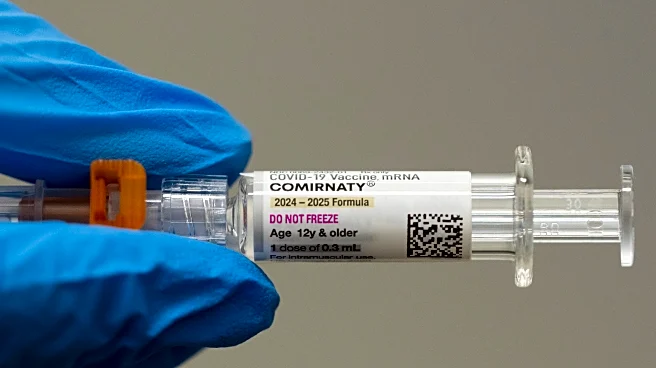What's Happening?
The American Heart Association and the American College of Cardiology have released new guidelines for managing high blood pressure, marking the first update since 2017. These guidelines emphasize a more aggressive approach to controlling blood pressure, recommending lifestyle changes as the first line of treatment for individuals with systolic blood pressure in the 130 to 139 mm Hg range. If these changes do not yield results within three to six months, medication is advised. Notably, the guidelines now suggest abstaining from alcohol, a shift from previous recommendations that allowed moderate consumption. The guidelines also highlight the importance of managing blood pressure to prevent cardiovascular diseases, strokes, kidney disease, and dementia. Dr. Daniel Jones, chair of the writing committee, underscores the significance of these changes, particularly in light of new evidence linking blood pressure management to reduced dementia risk.
Why It's Important?
These updated guidelines have significant implications for public health, as nearly half of U.S. adults have elevated blood pressure. By advocating for lifestyle changes and alcohol abstinence, the guidelines aim to reduce the incidence of heart disease, the leading cause of death globally. The emphasis on early intervention and lifestyle modification could lead to a decrease in healthcare costs associated with treating advanced cardiovascular conditions. Additionally, the focus on reducing dementia risk through blood pressure management highlights the interconnectedness of cardiovascular and neurological health, potentially influencing future research and public health strategies.
What's Next?
Healthcare providers are expected to adopt these guidelines, which may lead to increased patient education on lifestyle changes and the risks associated with alcohol consumption. The guidelines also call for monitoring blood pressure in pregnant individuals, which could improve maternal and fetal health outcomes. As these recommendations are implemented, further studies may be conducted to assess their effectiveness in reducing cardiovascular and dementia risks. Public health campaigns may also emerge to raise awareness about the importance of blood pressure management and the benefits of lifestyle changes.












